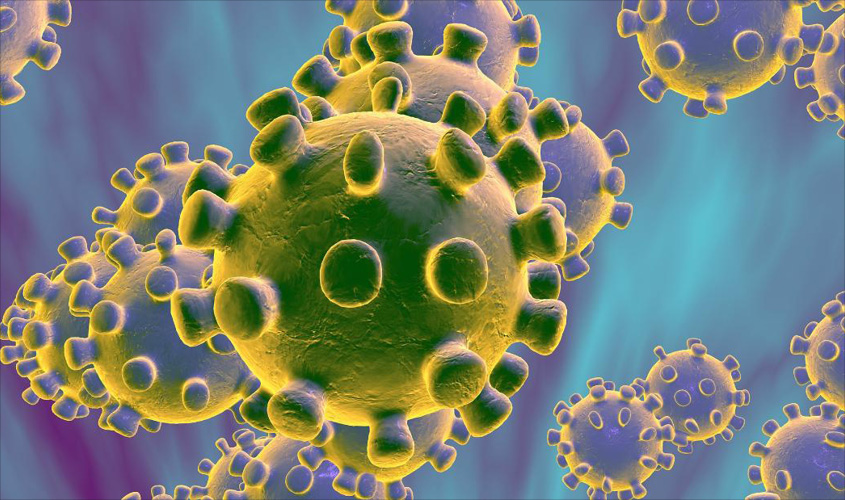COVID-19 has arrived in Iran at the worst possible time for its economy. Iran has been the source of dozens of cases of the virus appearing in neighbouring countries.
London: The news conference aired on national television was disastrous for Iran’s Deputy Health Minister, Iraj Harirchi, who was seen coughing and sweating profusely on Tuesday as he repeatedly tried to minimise Iran’s impending crisis with the outbreak of coronavirus. The following day he was officially diagnosed with the COVID-19, the official name of the disease. Needless to say, the video of the news conference has gone viral. Even worse, he was giving a live interview on state TV on the same day, insisting that there was nothing to worry about, when he wiped his nose with his hand and coughed without covering his mouth. Instead, he should have covered his mouth and uncovered the truth.
As of Friday, Iran has reported more deaths, 34, than any country after China, where 2,744 people have died from the highly infectious disease. While China has reported more than 78,000 confirmed cases, Iran has only admitted to 388 cases, a death rate of 9%, hugely greater than China’s. Several top officials have now contracted the virus in addition to Harirchi, including Masoumeh Ebtekar, the highest-ranking woman politician in the country. Iran’s Shia government has always been challenged by the truth, in this case greatly increasing the risk of a pandemic.
On Wednesday, researchers in Canada analysing the COVID-19 cases travelling from Iran to other countries, estimated that the true number of cases in Iran should be about 18,000. This accords with the claim from the Member of Parliament for Iran’s holy city of Qom, that 50 people had already died from COVID-19, a figure rejected by Iran’s Health Minister. With supreme irony, the Secretary of Iran’s Supreme National Security Council, tasked the prosecutor general to look into the lawmaker’s claim, saying that “spreading untrue reports and hiding the truth both disrupt national security and undermine the social capital”. There are reports that many “rumour-mongers” have been arrested.
The Iranian people are well-used to their government being disingenuous. In January, it initially denied that its revolutionary guards had shot down a Ukrainian airliner with 176 people on board, including 13 students and alumni from Tehran’s Sharif University. Only after days of protests did the government admit to its responsibility for downing the jet, the first such acknowledgment in decades.
Speaking at the National Headquarters for Disease Control on Tuesday, Iran’s President Hassan Rouhani, claimed in his traditional way that the problems are all a conspiracy by the country’s enemies: “The enemies of the people are planning to shut down Iran by creating fears about the virus.” Meanwhile, amid public concern about the safety of prisoners in Iranian jails, moderate Iranian politicians were canvassing for the release of political and security prisoners to avoid their decimation by the virus.
COVID-19 has arrived in Iran at the worst possible time for its economy. Iran has been the source of dozens of cases of the virus appearing in neighbouring countries, including Afghanistan, Bahrain, Iraq, Kuwait, Oman and Pakistan. These neighbours are shutting down their borders with the Islamic Republic, with the result that Iranian businessmen will find it much more difficult to travel to business centres such as Dubai and Abu Dhabi. Hundreds of thousands of Iranians working in the Gulf will not be visiting home for now and new jobs will be harder for Iranian migrants seeking work abroad. These workers have recently helped to relieve the pressure on the regime over high unemployment, while boosting the economy through remittances.
Iran’s economy was beginning to stabilise recently after a sharp contraction last year following America’s sanctions. Iran’s GDP fell almost 10% in 2019. The International Monetary Fund (IMF) projected zero growth for Iran in 2020, an improvement given the circumstances. Seizing the IMF report, Rouhani claimed recently that Iran had “ridden out the storm”, a claim which COVID-19 will now destroy, not least because of the huge loss of income from the millions of pilgrims who will not now be visiting the holy sites.
There will also be geopolitical consequences of COVID-19 for Iran. There have been recent massive anti-corruption protests in Iraq, largely against the influence of Iran. The transfer of the virus across the porous border with Iraq will increase tensions. The Iranian militias travelling to armed conflicts across the wider region will transfer the virus to countries such as Syria, Yemen and even Afghanistan, inflicting untold danger to those inhabitants with underdeveloped healthcare infrastructure. Already it is reported that Hezbollah fighters, who have travelled to Iran on pilgrimage, are refusing to follow quarantine instructions, claiming that it is all part of an anti-Iran conspiracy. The devastation caused by these fighters transferring the virus to the unprotected locals in Lebanon and Syria in particular will be catastrophic, unlikely to enhance the welcome they normally receive.
President Trump’s policy on Iran was to make it as ungovernable as possible through sanctions and other forms of pressure. In his simple view, this would inevitably lead to regime change. It was just a fevered fantasy. For some time it has been increasingly clear that the policy is not working, just as similar policies failed to work in the past. However, by progressively damaging Iran’s economy and also restricting its ability to export its military might, COVID-19 could come to Trump’s aid and achieve for him what he has so far clearly failed to accomplish himself.
John Dobson is a former British diplomat to Moscow and worked in UK Prime Minister John Major’s Office between 1995 and 1998.

